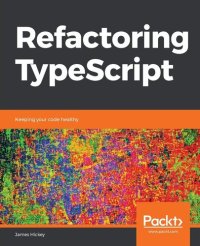
Ebook: Refactoring TypeScript: Keeping your code healthy
Author: James Hickey
- Publisher: Packt Publishing
- Language: English
- pdf
Discover various techniques to develop maintainable code and keep it in shape.
Key Features
- Learn all about refactoring - why it is important and how to do it
- Discover easy ways to refactor code with examples
- Explore techniques that can be applied to most other programming languages
Book Description
Refactoring improves your code without changing its behavior. With refactoring, the best approach is to apply small targeted changes to a codebase. Instead of doing a huge sweeping change to your code, refactoring is better as a long-term and continuous enterprise. Refactoring TypeScript explains how to spot bugs and remove them from your code.
You'll start by seeing how wordy conditionals, methods, and null checks make code unhealthy and unstable. Whether it is identifying messy nested conditionals or removing unnecessary methods, this book will show various techniques to avoid these pitfalls and write code that is easier to understand, maintain, and test.
By the end of the book, you'll have learned some of the main causes of unhealthy code, tips to identify them and techniques to address them.
What you will learn
- Spot and fix common code smells to create code that is easier to read and understand
- Discover ways to identify long methods and refactor them
- Create objects that keep your code flexible, maintainable, and testable
- Apply the Single Responsibility Principle to develop less-coupled code
- Discover how to combine different refactoring techniques
- Learn ways to solve the issues caused by overusing primitives
Who this book is for
This book is designed for programmers who are looking to explore various refactoring techniques to develop healthy and maintainable code. Some experience in JavaScript and TypeScript can help you easily grasp the concepts explained in this book.
Table of Contents
- Introduction
- Null Checks Everywhere!
- Wordy Conditionals
- Nested Conditionals
- Primitive Overuse
- Lengthy Method Signatures
- Methods That Never End
- Dumping Grounds
- Messy Object Creation
- Conclusion